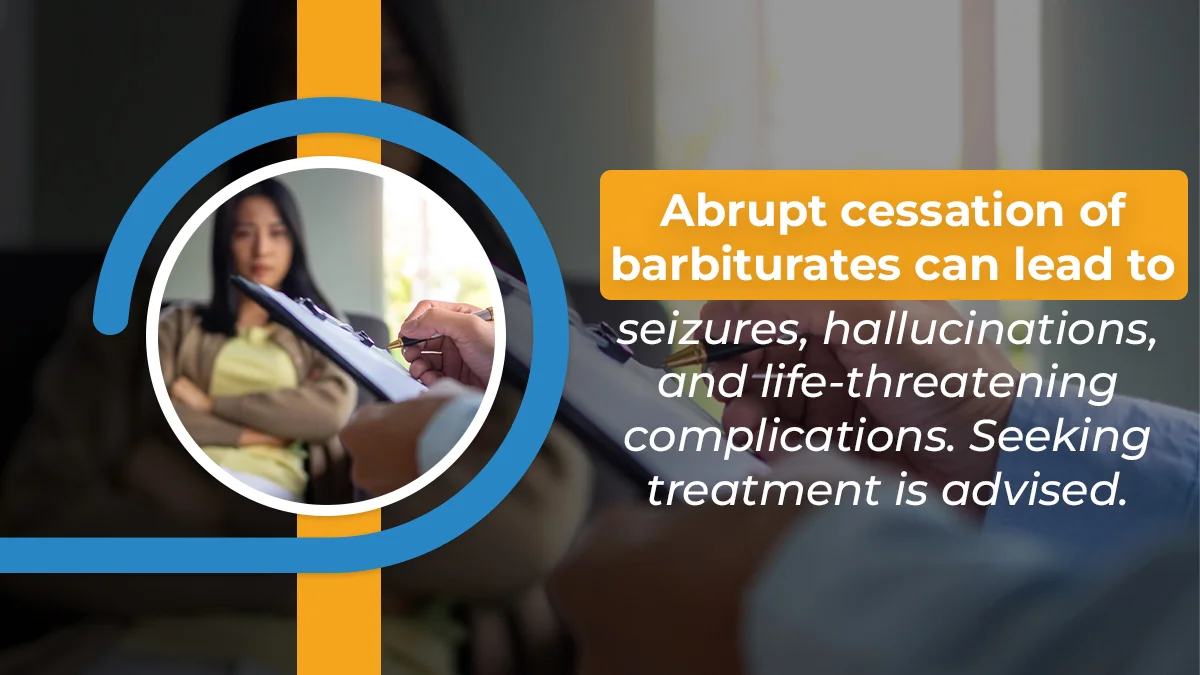Finding Help for Barbiturate Dependence
Barbiturate addiction refers to a severe condition where individuals become dependent on a type of sedative-hypnotic medication called barbiturates. Barbiturates are central nervous system (CNS) depressants, often prescribed for anxiety, sleep disorders, or seizures. When used beyond medical guidance, they can lead to tolerance, dependence, and addiction.
Seeking professional help is crucial to recovery, involving supervised detox and therapy to address underlying issues.
Key Takeaways
Barbiturate addiction can have severe effects on those dependent on these sedative-hypnotic medications. Here’s what you need to know:
- Common barbiturates include phenobarbital and secobarbital.
- Identify early signs such as behavioral changes, tolerance, and withdrawal symptoms.
- The extensive consequences on cognitive, physical, and psychological well-being caused by barbiturate addiction stress the urgent need for intervention and rehabilitation.
- The value of a holistic approach, combining detox, inpatient care, medication, and therapy, is needed for a successful journey to recovery.
The Recovery Team provides integrating personalized treatment plans for individuals who crave sustainable recovery from barbiturate addiction. Call us at (800) 817-1247 for further assistance.
What are Barbiturates?
Barbiturates are a central nervous system depressant medication. They function by slowing down brain activity and helping to manage conditions like anxiety, seizures, and insomnia. Physicians recommend medications for distinct health purposes, and it is vital to comply with their instructions.
However, barbiturates pose risks, including the potential for dependence and overdose. Misuse can lead the way to serious health issues and, in extreme cases, be fatal. It’s vital to take them only as prescribed and avoid alcohol, which intensifies their effects.
Common barbiturates include phenobarbital and secobarbital. Due to their high potential for misuse, their medical use has declined, replaced by safer alternatives. If you’re prescribed barbiturates, discuss any concerns with your healthcare provider and obey their instructions carefully to ensure safe and effective treatment.
Signs of Addiction
Identifying barbiturate addiction involves observing certain signs. Behavioral changes, such as increased secrecy or withdrawal from social activities, may indicate a problem.
Physical symptoms include drowsiness, impaired coordination, and slurred speech. A growing tolerance to the drug, where larger doses are needed for the same effect, is a red flag for addiction. Mood swings, stress, and irritability can also be indicators.
Seeking multiple doctors for prescriptions, known as doctor shopping, may occur. Sudden attempts to quit can lead to withdrawal symptoms like tremors and insomnia.
If you or someone you know is exhibiting any of these signs, it is crucial to seek professional help. Confer a healthcare provider or addiction specialist to address the issue and explore appropriate treatment options tailored to individual needs.
Impacts of Addiction
Barbiturate addiction takes a profound toll on both the body and mind, leading to far-reaching consequences. From cognitive impairment to physical health risks, the impacts are substantial.
It is important to thoroughly learn how these effects impact individuals, families, and communities. This knowledge will allow us to take meaningful actions and make informed decisions that can lead to positive change, as awareness and timely intervention are essential for comprehensive treatment.
Brain Function
Barbiturate addiction takes a toll on cognitive function. Prolonged use disrupts neurotransmitter activity, impairing memory, concentration, and decision-making. Chronic users may experience confusion and cognitive decline. Reversing these effects requires comprehensive treatment addressing both the physical and psychological aspects of addiction.
Physical Consequences
The physical consequences of barbiturate addiction are severe. Overdose can lead to respiratory loss and death. Additionally, chronic use may cause cardiovascular problems, liver damage, and compromised immune function. Long-term health risks emphasize the urgent need for intervention and rehabilitation.
Psychological Consequences
Barbiturates not only affect the body but also have profound psychological consequences. People may develop mood disorders, anxiety, and depression. These mental health challenges often perpetuate the cycle of addiction, creating a complex interplay between substance use and mental well-being.
Risks
The risks associated with barbiturate use extend beyond immediate health concerns, confining a spectrum of dangers that affect both individuals and society. From the risky threat of overdose to the insidious erosion of social bonds, delving into these risks illuminates the urgency of addressing barbiturate addiction with targeted interventions and support.
Overall Health
Barbiturates pose significant risks to overall health, with potential consequences ranging from respiratory depression to organ damage. The risk of overdose is exceptionally high, emphasizing the need for supervised withdrawal and medical intervention. Addiction treatment is vital for crushing the cycle of dependence and mitigating health risks.
Social and Emotional Consequences
Beyond physical health, barbiturate addiction erodes social connections and emotional well-being. Individuals may struggle to maintain relationships, experience isolation, and face challenges in professional and personal spheres. Addressing these social and emotional impacts is integral to a comprehensive recovery plan.
Barbiturate Withdrawal
Barbiturate withdrawal is the body and brain’s response when someone stops using these drugs. It’s an arduous journey, and symptoms vary.
Supervised withdrawal is necessary for the safety of the patient. Medical professionals guide the detox process, managing symptoms and ensuring safety. Gradual tapering is the safest method of barbiturate detox with no sudden stops.
Signs and Symptoms
Barbiturate withdrawal is a challenging process marked by physical and psychological symptoms. Abrupt cessation can lead to seizures, hallucinations, and life-threatening complications. Gradual tapering, under medical supervision, is the safest approach. Understanding withdrawal symptoms is crucial for individuals and their support networks during recovery.
Getting Help for Barbiturate Addiction
Finding support for barbiturate addiction is a crucial step toward a healthier life. Start by consulting a healthcare expert who can guide you through the process. Treatment options include detoxification, counseling, and ongoing support.
Recovery is a marathon, not a sprint. To seek help, you can contact nearby support groups or treatment centers. Family and friends play a vital role, too; their understanding and motivation can make a significant difference. Remember, seeking help is a commendable decision, and it’s never too late to start the path to recovery.
Importance of Treatment
Seeking help for barbiturate addiction is not a sign of weakness but a daring step towards reclaiming one’s life. Treatment options include detoxification, counseling, and ongoing support. Medical professionals play a vital role in managing withdrawal symptoms and addressing the complex interplay between the physical and psychological aspects of addiction.
Recovery from barbiturate addiction requires a holistic approach, circling medical, psychological, and social components. While detoxification addresses physical dependence, counseling and therapy help individuals understand and overcome the underlying issues contributing to addiction.
Types of Treatment
Barbiturate misuse demands careful and specialized treatment to support individuals facing substance abuse. Different approaches, from detox to therapy like CBT, are vital for addiction recovery.
Detox: The detoxification method is the initial step in treating barbiturate misuse. It involves gradually reducing drug intake under medical supervision. This process helps the body adjust to lower doses, minimizing withdrawal symptoms.
Inpatient: Residential care requires patients to reside in a facility for a specified period. This immersive approach ensures 24/7 care, which is vital for those with severe barbiturate addiction or co-occurring medical conditions.
Outpatient Medications: Outpatient treatment involves medications to support recovery. Benzodiazepines, prescribed in controlled amounts, aid in managing withdrawal symptoms, preventing the need for higher doses of barbiturates.
Cognitive Behavioral Therapy: Cognitive behavioral therapy (CBT) manages the psychological aspects of addiction. It helps individuals understand and modify behaviors, promoting healthier coping mechanisms. CBT is particularly effective in treating anxiolytic use disorder and anxiety disorders.
Various therapeutic approaches cater to people with diverse needs. Learning the therapeutic effects of these sedative-hypnotics guides medical professionals in crafting personalized treatment plans. Overall, combining detox, inpatient care, outpatient medications, and cognitive behavioral therapy forms a holistic strategy, ensuring effective and compassionate support for individuals on their journey to recovery.
Overcome Addiction With The Recovery Team
At The Recovery Team, we pride ourselves on helping individuals triumph over addiction, whether it’s tied to drugs or alcohol.
In our residential treatment, we offer a nurturing environment for recovery. Our outpatient programs, with personalized solutions and controlled medication support, form the backbone of effective barbiturate addiction management.
Our specialized dual diagnosis program addresses the link between substance use and mental health. We also employ cognitive behavioral therapy (CBT) to help you develop healthier coping mechanisms and behaviors for long-term recovery.
Call (800) 817-1247 to take the first step toward your path to freedom.






